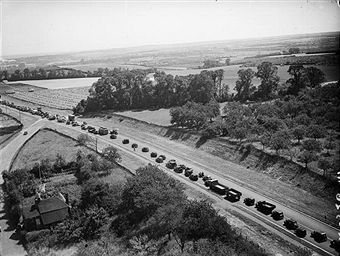 Monday is the August Bank Holiday – at least in England and Wales, where it is the
last weekend before the schools go back. In Scotland, the schools break up earlier (traditionally, so the kids could join in the work of lifting potatoes in the fields) but have already gone back.
Monday is the August Bank Holiday – at least in England and Wales, where it is the
last weekend before the schools go back. In Scotland, the schools break up earlier (traditionally, so the kids could join in the work of lifting potatoes in the fields) but have already gone back.
The August Bank Holiday is just one of eight permanent bank holidays in England and Wales (along with New Year, Good Friday and Easter Monday, the Early May Bank Holiday, the Spring Bank Holiday in late May, Christmas Day and Boxing Day). In Scotland there are nine – an extra day at New Year and St Andrew’s Day to replace the August holiday). Northern Ireland has ten, which include St Patrick’s Day and the anniversary of the Battle of the Boyne in 1690. Throughout the UK there will be an extra holiday on 5 June 2011, the Queen’s Diamond Jubilee.
Bank holidays are a barbarous relic and should be abolished. Some religious holidays were long considered days of rest, but in 1871 the Liberal government added four more (five in Scotland). The idea was that, since all business was done in cash, closing the banks meant that firms couldn’t operate and employees pretty much had to have a day off.
Today, under a 1971 law, bank holidays are made by royal proclamation. Which means that politicians decide them. Naturally, every politician wants to appear generous and to use the system for their political advantage. Jim Callaghan’s Labour government added May Day (even though there is already a bank holiday in May) to express political solidarity with the world’s workers (or maybe to make the left of the party feel better). There is a suggestion in England that St George’s Day (or Shakespeare’s Birthday) should be added. And that Trafalgar Day should be.
Employees don’t have an automatic right to paid leave on public holidays; it depends on their contract of employment. But all UK workers have a right to 28 days’ paid annual leave. So why do we still preserve this throwback? Their effect is that we all take off exactly the same days, instead of our holiday time being staggered. This weekend, if there’s the faintest glimmer of sun, the roads to the coast will be as congested as they always are. Easter weekend is a travel nightmare (often helped along by striking French air traffic controllers). Curiously, despite the volume of traffic, the August Bank Holiday weekends is for some reason one of the safest on the roads. The Friday after the Holiday is the worst, and busy, holiday-period Fridays and Saturdays are bad generally. In general, though, bank holidays certainly don’t help – the more congested the roads are, as with the Spring Bank Holiday, the likelier it is that there will be accidents.
So why should our holidays be nationalized, as they are? Maybe it just provides our politicians with some feelgood kudos. Standard holidays are very visible. If people take off exactly the same number of days, but at different times, they are not, and perhaps we would take them more for granted. But making our politicians look and feel good should, I think, not be a function of sensible public policy.
Eamonn Butler is director of the Adam Smith Institute






Comments